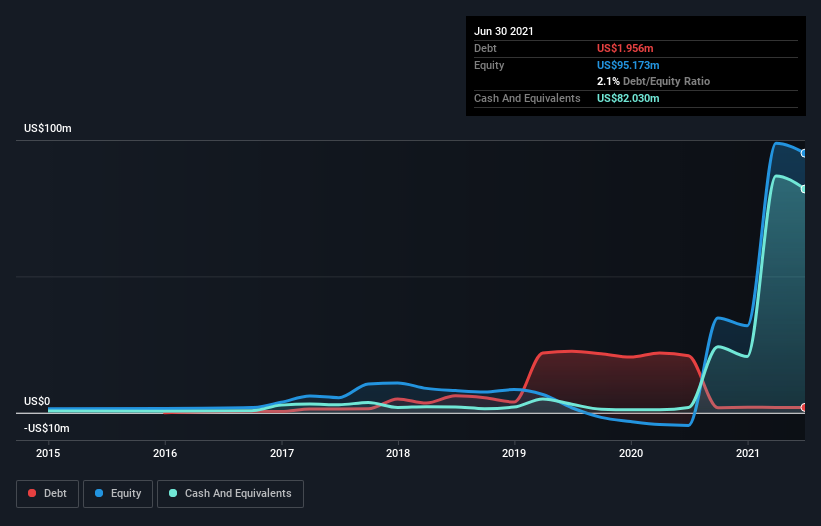- United States
- /
- Software
- /
- NasdaqCM:REKR
Despite Lacking Profits Rekor Systems (NASDAQ:REKR) Seems To Be On Top Of Its Debt

Warren Buffett famously said, 'Volatility is far from synonymous with risk.' When we think about how risky a company is, we always like to look at its use of debt, since debt overload can lead to ruin. We can see that Rekor Systems, Inc. (NASDAQ:REKR) does use debt in its business. But is this debt a concern to shareholders?
Why Does Debt Bring Risk?
Debt assists a business until the business has trouble paying it off, either with new capital or with free cash flow. If things get really bad, the lenders can take control of the business. However, a more common (but still painful) scenario is that it has to raise new equity capital at a low price, thus permanently diluting shareholders. Of course, debt can be an important tool in businesses, particularly capital heavy businesses. When we think about a company's use of debt, we first look at cash and debt together.
See our latest analysis for Rekor Systems
What Is Rekor Systems's Net Debt?
The image below, which you can click on for greater detail, shows that Rekor Systems had debt of US$1.96m at the end of June 2021, a reduction from US$20.9m over a year. But it also has US$82.0m in cash to offset that, meaning it has US$80.1m net cash.

How Healthy Is Rekor Systems' Balance Sheet?
The latest balance sheet data shows that Rekor Systems had liabilities of US$8.08m due within a year, and liabilities of US$1.31m falling due after that. Offsetting these obligations, it had cash of US$82.0m as well as receivables valued at US$2.34m due within 12 months. So it can boast US$75.0m more liquid assets than total liabilities.
This short term liquidity is a sign that Rekor Systems could probably pay off its debt with ease, as its balance sheet is far from stretched. Succinctly put, Rekor Systems boasts net cash, so it's fair to say it does not have a heavy debt load! The balance sheet is clearly the area to focus on when you are analysing debt. But ultimately the future profitability of the business will decide if Rekor Systems can strengthen its balance sheet over time. So if you're focused on the future you can check out this free report showing analyst profit forecasts.
Over 12 months, Rekor Systems reported revenue of US$13m, which is a gain of 84%, although it did not report any earnings before interest and tax. Shareholders probably have their fingers crossed that it can grow its way to profits.
So How Risky Is Rekor Systems?
Statistically speaking companies that lose money are riskier than those that make money. And we do note that Rekor Systems had an earnings before interest and tax (EBIT) loss, over the last year. Indeed, in that time it burnt through US$13m of cash and made a loss of US$21m. Given it only has net cash of US$80.1m, the company may need to raise more capital if it doesn't reach break-even soon. Rekor Systems's revenue growth shone bright over the last year, so it may well be in a position to turn a profit in due course. By investing before those profits, shareholders take on more risk in the hope of bigger rewards. The balance sheet is clearly the area to focus on when you are analysing debt. However, not all investment risk resides within the balance sheet - far from it. Case in point: We've spotted 4 warning signs for Rekor Systems you should be aware of.
Of course, if you're the type of investor who prefers buying stocks without the burden of debt, then don't hesitate to discover our exclusive list of net cash growth stocks, today.
New: AI Stock Screener & Alerts
Our new AI Stock Screener scans the market every day to uncover opportunities.
• Dividend Powerhouses (3%+ Yield)
• Undervalued Small Caps with Insider Buying
• High growth Tech and AI Companies
Or build your own from over 50 metrics.
This article by Simply Wall St is general in nature. We provide commentary based on historical data and analyst forecasts only using an unbiased methodology and our articles are not intended to be financial advice. It does not constitute a recommendation to buy or sell any stock, and does not take account of your objectives, or your financial situation. We aim to bring you long-term focused analysis driven by fundamental data. Note that our analysis may not factor in the latest price-sensitive company announcements or qualitative material. Simply Wall St has no position in any stocks mentioned.
Have feedback on this article? Concerned about the content? Get in touch with us directly. Alternatively, email editorial-team (at) simplywallst.com.
About NasdaqCM:REKR
Rekor Systems
A technology company, provides infrastructure solutions for transportation, public safety, and urban mobility markets in the United States and internationally.
Slight and slightly overvalued.


